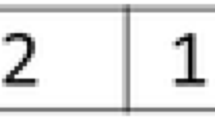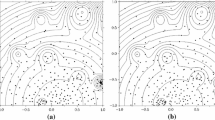Abstract
We propose and analyze an asynchronously parallel optimization algorithm for finding multiple, high-quality minima of nonlinear optimization problems. Our multistart algorithm considers all previously evaluated points when determining where to start or continue a local optimization run. Theoretical results show that when there are finitely many minima, the algorithm almost surely starts a finite number of local optimization runs and identifies every minimum. The algorithm is applicable to general optimization settings, but our numerical results focus on the case when derivatives are unavailable. In numerical tests, a Python implementation of the algorithm is shown to yield good approximations of many minima (including a global minimum), and this ability is shown to scale well with additional resources. Our implementation’s time to solution is shown also to scale well even when the time to perform the function evaluation is highly variable. An implementation of the algorithm is available in the libEnsemble library at https://github.com/Libensemble/libensemble.













Similar content being viewed by others
References
Audet, C., Dennis Jr., J.E., Le Digabel, S.: Parallel space decomposition of the mesh adaptive direct search algorithm. SIAM J. Optim. 19(3), 1150–1170 (2008). https://doi.org/10.1137/070707518
Balay, S., Abhyankar, S., Adams, M.F., Brown, J., Brune, P., Buschelman, K., Dalcin, L., Eijkhout, V., Gropp, W.D., Kaushik, D., Knepley, M.G., McInnes, L.C., Rupp, K., Smith, B.F., Zampini, S., Zhang, H.: PETSc Web page (2017). http://www.mcs.anl.gov/petsc
Besserud, K., Cotten, J.: Architectural genomics, silicon + skin: biological processes and computation. In: Proceedings of the 28th Annual Conference of the Association for Computer Aided Design in Architecture, pp. 978–989 (2008)
Cave, R.J., Burke, K., Castner Jr., E.W.: Theoretical investigation of the ground and excited states of Coumarin 151 and Coumarin 120. J. Phys. Chem. A 106(40), 9294–9305 (2002). https://doi.org/10.1021/jp026071x
Custódio, A.L., Madeira, J.F.A.: GLODS: global and local optimization using direct search. J. Glob. Optim. 62(1), 1–28 (2015). https://doi.org/10.1007/s10898-014-0224-9
Dalcín, L., Paz, R., Storti, M., D’Elía, J.: MPI for Python: performance improvements and MPI-2 extensions. J. Parallel Distrib. Comput. 68(5), 655–662 (2008). https://doi.org/10.1016/j.jpdc.2007.09.005
Easterling, D.R., Watson, L.T., Madigan, M.L., Castle, B.S., Trosset, M.W.: Parallel deterministic and stochastic global minimization of functions with very many minima. Comput. Optim. Appl. 57(2), 469–492 (2014). https://doi.org/10.1007/s10589-013-9592-1
García-Palomares, U.M., Rodríguez, J.F.: New sequential and parallel derivative-free algorithms for unconstrained minimization. SIAM J. Optim. 13(1), 79–96 (2002). https://doi.org/10.1137/S1052623400370606
Gaviano, M., Kvasov, D.E., Lera, D., Sergeyev, Y.D.: Algorithm 829: software for generation of classes of test functions with known local and global minima for global optimization. ACM Trans. Math. Softw. 29(4), 469–480 (2003). https://doi.org/10.1145/962437.962444
Gheribi, A.E., Robelin, C., Le Digabel, S., Audet, C., Pelton, A.D.: Calculating all local minima on liquidus surfaces using the FactSage software and databases and the mesh adaptive direct search algorithm. J. Chem. Thermodyn. 43(9), 1323–1330 (2011). https://doi.org/10.1016/j.jct.2011.03.021
Gray, G.A., Kolda, T.G.: Algorithm 856: APPSPACK 4.0: asynchronous parallel pattern search for derivative-free optimization. ACM Trans. Math. Softw. 32(3), 485–507 (2006). https://doi.org/10.1145/1163641.1163647
Hansen, N.: CMA-ES. https://www.lri.fr/~hansen/cmaes_inmatlab.html#matlab. Accessed Nov 2016
Hansen, N., Müller, S.D., Koumoutsakos, P.: Reducing the time complexity of the derandomized evolution strategy with covariance matrix adaptation (CMA-ES). Evol. Comput. 11(1), 1–18 (2003). https://doi.org/10.1162/106365603321828970
He, J., Verstak, A., Sosonkina, M., Watson, L.: Performance modeling and analysis of a massively parallel DIRECT-Part 2. Int. J. High Perform. Comput. Appl. 23(1), 29–41 (2009). https://doi.org/10.1177/1094342008098463
He, J., Verstak, A., Watson, L., Sosonkina, M.: Performance modeling and analysis of a massively parallel DIRECT-Part 1. Int. J. High Perform. Comput. Appl. 23(1), 14–28 (2009). https://doi.org/10.1177/1094342008098462
He, J., Verstak, A., Watson, L.T., Sosonkina, M.: Design and implementation of a massively parallel version of DIRECT. Comput. Optim. Appl. 40(2), 217–245 (2007). https://doi.org/10.1007/s10589-007-9092-2
Hough, P.D., Kolda, T.G., Torczon, V.J.: Asynchronous parallel pattern search for nonlinear optimization. SIAM J. Sci. Comput. 23(1), 134–156 (2001). https://doi.org/10.1137/S1064827599365823
Johnson, S.G.: The NLopt Nonlinear-Optimization Package. http://ab-initio.mit.edu/nlopt (2017)
Jones, D.R., Perttunen, C.D., Stuckman, B.E.: Lipschitzian optimization without the Lipschitz constant. J. Optim. Theory Appl. 79(1), 157–181 (1993). https://doi.org/10.1007/BF00941892
Larson, J.: libEnsemble. https://github.com/Libensemble/libensemble (2017)
Larson, J., Wild, S.M.: A batch, derivative-free algorithm for finding multiple local minima. Optim. Eng. 17(1), 205–228 (2016). https://doi.org/10.1007/s11081-015-9289-7
Liuzzi, G., Truemper, K.: Parallelized hybrid optimization methods for nonsmooth problems using NOMAD and linesearch. Comput. Appl. Math. (2017). https://doi.org/10.1007/s40314-017-0505-2
Moré, J.J., Wild, S.M.: Benchmarking derivative-free optimization algorithms. SIAM J. Optim. 20(1), 172–191 (2009). https://doi.org/10.1137/080724083
Olsson, P.M.: Methods for Network Optimization and Parallel Derivative-Free Optimization, Ph.D. Thesis. Linköping University. http://liu.diva-portal.org/smash/get/diva2:695431/FULLTEXT02.pdf (2014)
Plantenga, T.D.: HOPSPACK 3.0 User Manual, Technical Report October. Sandia National Laboratories, Albuquerque (2009)
Powell, M.J.D.: The BOBYQA Algorithm for Bound Constrained Optimization Without Derivatives, Technical Report. DAMTP 2009/NA06, Department of Applied Mathematics and Theoretical Physics, University of Cambridge (2009)
Rinnooy Kan, A.H.G., Timmer, G.T.: Stochastic global optimization methods, part I: clustering methods. Math. Program. 39(1), 27–56 (1987). https://doi.org/10.1007/BF02592070
Rinnooy Kan, A.H.G., Timmer, G.T.: Stochastic global optimization methods, part II: multi level methods. Math. Program. 39(1), 57–78 (1987). https://doi.org/10.1007/BF02592071
Ross, S.M.: A First Course in Probability, 8th edn. Prentice Hall, Upper Saddle River (2009)
Törn, A., Zilinskas, A.: Global Optimization. Springer, New York (1989). https://doi.org/10.1007/3-540-50871-6
Vanden Berghen, F.: CONDOR: A Constrained, Non-linear, Derivative-Free Parallel Optimizer for Continuous, High Computing Load, Noisy Objective Functions, Ph.D. Thesis. Université Libre de Bruxelles. http://www.applied-mathematics.net/optimization/thesis_optimization.pdf (2004)
Vaz, A.I.F., Vicente, L.N.: A particle swarm pattern search method for bound constrained global optimization. J. Glob. Optim. 39(2), 197–219 (2007). https://doi.org/10.1007/s10898-007-9133-5
Wild, S.M.: Derivative-Free Optimization Algorithms for Computationally Expensive Functions, Ph.D. Thesis. Cornell University. http://ecommons.cornell.edu/handle/1813/11248 (2009)
Acknowledgements
This material was based upon work supported by the U.S. Department of Energy, Office of Science through the Office of Advanced Scientific Computing Research (Contract No. DE-AC02-06CH11357) and the Exascale Computing Project (Contract No. 17-SC-20-SC). We gratefully acknowledge the computing resources provided by the Laboratory Computing Resource Center at Argonne National Laboratory. We thank Gail Pieper for her editing.
Author information
Authors and Affiliations
Corresponding author
A The APOSMM implementation in libEnsemble
A The APOSMM implementation in libEnsemble
The libEnsemble library [20] is designed to manage collections of computations such as those related to concurrent objective function evaluations; libEnsemble includes an implementation of APOSMM. The libEnsemble library coordinates the custodian, manager, and worker functions presented in Fig. 1. By letting libEnsemble handle the coordination of (asynchronous or batch) function evaluations and other calculations, APOSMM can focus on efficiently requesting particular points to be evaluated. This allows flexibility for users wish to customize APOSMM or write their own point-generating and/or point-prioritizing routines.
The sequence of points generated by APOSMM within libEnsemble correspond to the sequence generated by Algorithm 1. When APOSMM is queried by libEnsemble (after prior/initial evaluations have been performed), APOSMM generates points in existing local optimization runs or starts new runs as necessary. If no local optimization runs exist or if insufficient sampling has occurred, then APOSMM produces points drawn uniformly from the specified domain.
The libEnsemble library contains a growing set of example scripts to call APOSMM (and other generating functions) to optimize specified objective functions under different settings. Provided objective examples include simple Python functions as well as functions based on output from a simulation involving an external MPI-based parallel evaluation. The libEnsemble library also includes example scripts capable of terminating unresponsive simulation-based objectives or observing intermediate simulation output and preempting evaluations. Algorithmic parameters for APOSMM are readily available as part of the examples provided in libEnsemble.
Rights and permissions
About this article
Cite this article
Larson, J., Wild, S.M. Asynchronously parallel optimization solver for finding multiple minima. Math. Prog. Comp. 10, 303–332 (2018). https://doi.org/10.1007/s12532-017-0131-4
Received:
Accepted:
Published:
Issue Date:
DOI: https://doi.org/10.1007/s12532-017-0131-4
Keywords
- Parallel optimization algorithms
- Multistart
- Global optimization
- Derivative-free optimization
- Concurrent function evaluations




